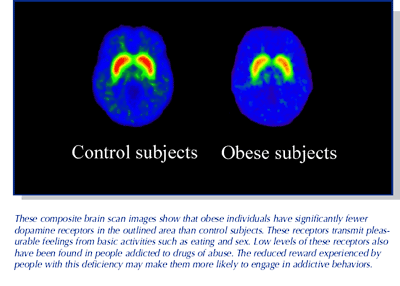Reduced brain activity of dopamine, a naturally occurring substance that modulates feelings of pleasure, may contribute to obesity as well as drug addiction, a NIDA-funded study suggests. The study found that the brains of obese individuals have relatively few of the nerve cell components called D2 receptors through which dopamine acts to stimulate pleasurable feelings from basic activities such as eating and sex. Individuals with this deficiency may need to overeat to get feelings of gratification from food, the researchers say. Because a deficit of the same receptor has been implicated in addiction to cocaine, heroin, and other drugs of abuse, the researchers suggest that it may be linked to a range of compulsive behaviors.
“Although many complex factors may be involved in excessive behaviors such as compulsive drug abuse, overeating, and gambling, they are all similar in that the brain is changed, reward circuits are disrupted, and the behavior eventually becomes involuntary,” says Dr. Joseph Frascella of NIDA’s Division of Treatment Research and Development. “Finding low D2 receptors across various drugs of abuse and now obesity suggests a common brain mechanism that could contribute to such disorders,” he says.

In the study, Dr. Gene-Jack Wang and Dr. Nora Volkow of Brookhaven National Laboratory in Upton, New York, used positron emission tomography (PET) to assess metabolic activity and dopamine D2 receptor levels in the brains of 10 severely obese and 10 nonobese subjects. The obese group included five men and five women and the control group had seven men and three women. Obese subjects had an average mass index (BMI) of 51.2. Controls had an average BMI of 24.7. BMI is a measure of weight in relation to height. An index of 25 or greater is considered overweight and an index of 30 or above is considered obese.
The PET scans showed that, compared to controls, obese individuals had significantly fewer dopamine D2 receptors in the striatum, an area of the brain where dopamine receptors are particularly concentrated. Data analyses showed that neither gender nor brain metabolism was related to the differences in receptor availability between the two groups. The best direct relationship to receptor levels was BMI–the greater an individual’s BMI, the fewer available dopamine D2 receptors.
The brain area the researchers imaged includes the nucleus accumbens (NAc), the central structure in the brain’s reward system. Eating increases extracellular levels of dopamine in the NAc, producing feelings of satisfaction and pleasure, the researchers explain. Previous research has shown that drugs that increase dopamine concentrations in this area decrease appetite. Conversely, drugs that block dopamine receptors increase appetite and lead to significant weight gain. “Thus, low D2 receptor levels in obese individuals may contribute to continued overeating to compensate for reduced stimulation of their brain reward circuits,” Dr. Wang says.
“It is through activation of these circuits that we are motivated to do the things we perceive as pleasurable,” Dr. Volkow says. “If you have a decrease in dopamine receptors that transmit pleasurable feelings, you become less responsive to the stimuli, such as food or sex, that normally activate them,” she says. “When these activities don’t reward you enough, your brain signals you to do something that will stimulate the circuits sufficiently to create a sense of well-being. Thus, an individual who has low sensitivity to normal stimuli learns behaviors, such as abusing drugs or overeating, that will activate them.”
It remains unclear whether low D2 brain receptor levels are a cause or a consequence of addictive behaviors–or both. “This deficiency could be a double-edged sword that cuts both ways,” says NIDA’s Dr. Frascella. First, the reduced reward experienced by people with this deficiency may make them more likely to engage in addictive behaviors. Then, the addictive behavior itself could make the deficit worse as the brain further lowers D2 levels in response to constant overstimulation of the reward pathway. “In the end, they could be much worse off biologically than when they started,” he says.
“This phenomenon has important implications for drug abuse treatment,” Dr. Volkow says. “If the only behavior that will activate reward centers is taking drugs, then people are going to take drugs. However, if treatment can help drug abuse patients to develop alternative behaviors that can activate these centers, they can start to replace drug use with these behaviors.”
Source
- Wang, G-J.; Volkow, N.D.; et al. Brain dopamine and obesity. Lancet 357(9253):354-357, 2001.
